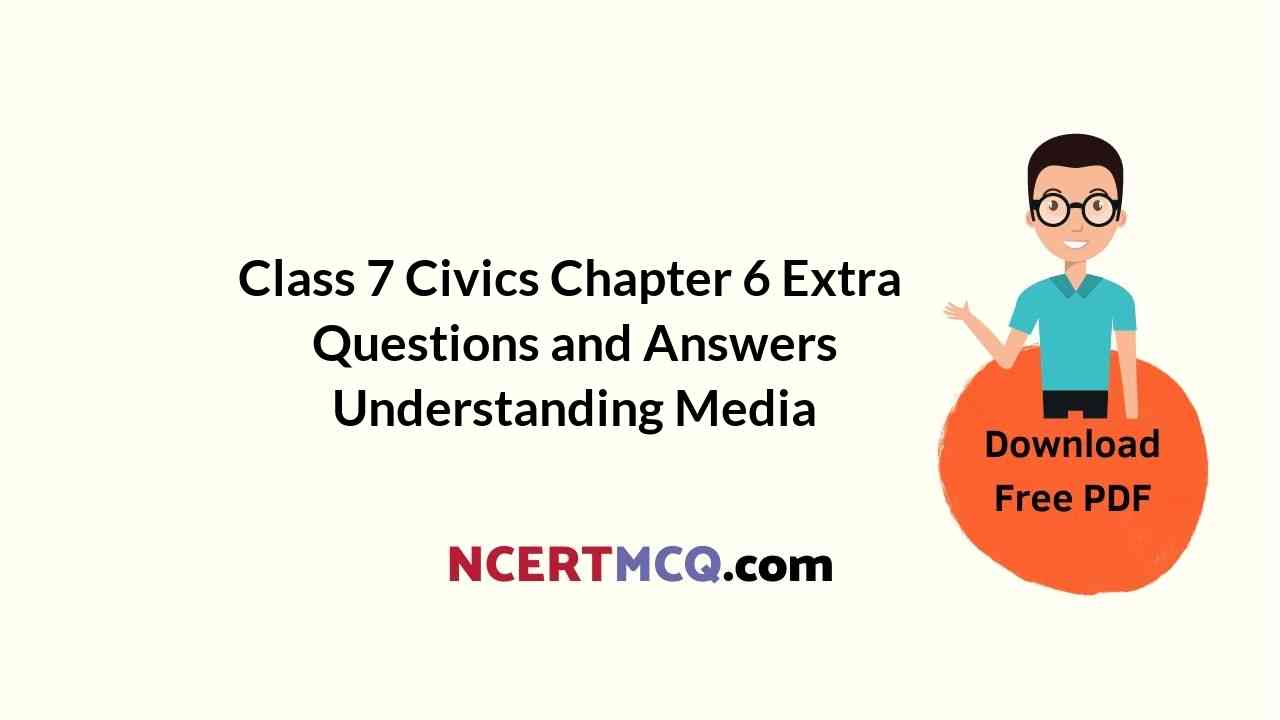Check the below Online Education NCERT MCQ Questions for Class 7 Civics Chapter 6 Extra Questions and Answers Understanding Media Pdf free download. https://ncertmcq.com/extra-questions-for-class-7-social-science/
Online Education for Understanding Media Class 7 Extra Questions Civics Chapter 6
Class 7 Civics Chapter 6 Extra Questions Question 1.
What is media?
Answer:
All means of communication are collectively referred to as media.
Understanding Media Class 7 Extra Questions Question 2.
Why are newspapers called print media?
Answer:
The newspapers are called print media, because these newspapers use print technology in reporting their news, etc.
Understanding Media Class 7 Worksheet With Answers Question 3.
What is censorship?
Answer:
When the government prevents media from making a news or programme or their parts public, it is called censorship.
![]()
Understanding Media Class 7 Questions And Answers Question 4.
What do you mean by mass media?
Answer:
Those forms of media that reaches millions of people or the masses, across the country and the world, are called mass media. For example, Television, radio and newspapers.
Class 7 Civics Chapter 6 Extra Questions And Answers Question 5.
How does the technology help media?
Answer:
The technology helps media to reach more people. It also improves the quality of print, sound and the images that reaches to the public.
Understanding Media Class 7 Extra Questions And Answers Question 6.
What role does media play in democracy?
Answer:
- In democracy, the media plays a significant role in providing news arid discussing events that generally takes place in the country and the world.
- Through these news the citizen come to know about the work of the government and decide their action.
Class 7 Civics Ch 6 Extra Questions Question 7.
What is the role of TV in our live?
Answer:
- At present we can not imagine oiribes without TV. It has made us the members of the world community.
- It allows us to view news and entertainment ctannels across the world through satellites and cables.
- We can see live telecasts of any event, natural calamities, etc., happening in one, corner while sitting in other corners of the world. Thus, the TV has changed the world into a small village.
![]()
Multiple Choice Questions (MCQs)
1. Which one of the following terms is used to refer to the radio, TV, newspapers, internet and several forms of communications?
(a) LCD
(b) Mass Media
(c) Print Media
(d) Electronic Media.
Answer:
(b) Mass Media
Understanding Media Extra Questions
2. Which one of the following is an example of Print Media?
(a) Newspapers
(b) TV
(c) Radio
(d) Internet.
Answer:
(a) Newspapers.
Ncert Class 7 Civics Chapter 6 Extra Questions
3. Which one of the following is different from the other three, \Vith reference to the electronic media?
(a) TV
(b) Radio
(c) Stereo
(d) Magazines.
Answer:
(d) Magazines.
![]()
Class 7 Civics Understanding Media Extra Questions
4. Which one of the following is false about the changing technology?
(а) It improves the quality of sound.
(b) It can’t be used anytime and anyplace.
(c) It improves the images.
(d) It helps media to reach more and more people.
Answer:
(b) It can’t be used anytime and anyplace.
Chapter 6 Civics Class 7 Extra Questions
5. Television images travel huge distances through;
(а) electricity
(b) satellites and cables
(c) new technology
(d) improved machines.
Answer:
(b) satellites and cables.
Ch 6 Civics Class 7 Extra Questions
6. Which one of the following is mainly associated with Japan and United States?
(a) Serials
(b) Movies
(c) News
(d) Cartoon.
Answer:
(d) Cartoon.
Ncert Solutions For Class 7 Civics Chapter 6 Extra Questions
7. Which, one of the following statements is true about the independent media?
(a) It should be controlled by high-class people.
(b) It should be controlled by university students.
(c) It should not be controlled and influenced by any organisation.
(d) It should be controlled by the government.
Answer:
(c) It should not be controlled and influenced by any organisation.
![]()
Class 7 Civics Chapter 6 Question Answer
8. Which one of the following is important in a democracy? ,
(a) Independent media
(b) TVs
(c) Radios
(d) Newspapers.
Answer:
(a) Independent media.
Media And Democracy Class 7 Questions And Answers
9. Why is the media far from independence?
(а) Government’s control on the media
(b) Because it shows news only
(c) Because of the lack of entertainment
(d) Because they need money from big organisations.
Answer:
(а) Government’s control on the media.
Class 7 Civics Chapter 6 Questions And Answers
10. In which one of the following periods, the media was censored by the government?
(a) 1990-1991
(b) 1975-1977
(c) 1976-1980
(d) 1980-1985.
Answer:
(b) 1975-1977.
Extra Questions On Understanding Media Class 7
11. The media influence our;
(a) food habits
(b) clothing
(c) lifestyle
(d) thoughts, feelings and actions.
Answer:
(d) thoughts, feelings and actions.
Extra Questions For Class 7 Civics Chapter 6
12. Which one of the following newspapers is run by eight Dalit women in Uttar Pradesh?
(a) Janata
(b) Khabar Lahriya
(c) Maro Gaun
(d) Meri Baat
Answer:
(b) Khabar Lahriya.
Important Terms:
Publish: Publish means to produce or print news reports, articles, interviews, stories, etc., in newspapers, magazines, journals and books for a wide audience to read.
Censorship: Censorship is the power that authorises the government to examine material or certain stories that is to be published and ban anything considered offensive or a threat to security either in part or whole of a media, i.e., book, film, newspapers, etc.
Broadcast: Broadcast is the process of transmission of different types of informative popular programmes by radio or television to aware and entertains the people.
Public protest: Public protest is a powerful way by which a large number of people come together and openly state their opposition to some issues or draw attention to injustices. It is generally done by organising public rallies and demonstrations, starting a signature campaign, blocking roads, etc.
